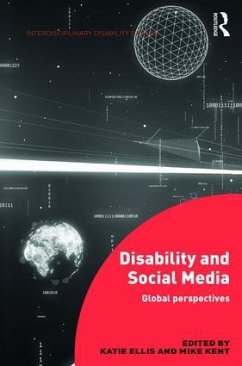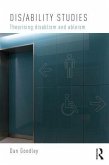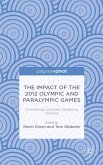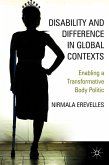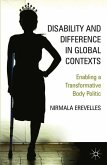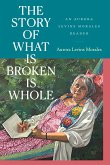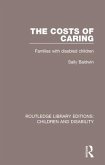Disability and Social Media
Global Perspectives
Herausgeber: Ellis, Katie; Kent, Mike
Schade – dieser Artikel ist leider ausverkauft. Sobald wir wissen, ob und wann der Artikel wieder verfügbar ist, informieren wir Sie an dieser Stelle.
Disability and Social Media
Global Perspectives
Herausgeber: Ellis, Katie; Kent, Mike
- Gebundenes Buch
- Merkliste
- Auf die Merkliste
- Bewerten Bewerten
- Teilen
- Produkt teilen
- Produkterinnerung
- Produkterinnerung
This book considers the impacts of our increasing reliance on social media for people with disability through a number of international case studies. The book celebrates and complicates the increasing visibility of disability through social media, by acknowledging and analysing the opportunities and challenges social media represents for the social inclusion of people with disabilities. Disability and Social Media is a significant book for scholars and students interested in the critical analysis of social media in disciplines including internet, cultural, communication and media, and disability studies.…mehr
Andere Kunden interessierten sich auch für
![Dis/ability Studies Dis/ability Studies]() Dan GoodleyDis/ability Studies40,99 €
Dan GoodleyDis/ability Studies40,99 €![The Impact of the 2012 Olympic and Paralympic Games The Impact of the 2012 Olympic and Paralympic Games]() The Impact of the 2012 Olympic and Paralympic Games38,99 €
The Impact of the 2012 Olympic and Paralympic Games38,99 €![Other-person-ness and the Person with Profound Disabilities Other-person-ness and the Person with Profound Disabilities]() Pia MatthewsOther-person-ness and the Person with Profound Disabilities60,99 €
Pia MatthewsOther-person-ness and the Person with Profound Disabilities60,99 €![Disability and Difference in Global Contexts Disability and Difference in Global Contexts]() N. ErevellesDisability and Difference in Global Contexts38,99 €
N. ErevellesDisability and Difference in Global Contexts38,99 €![Disability and Difference in Global Contexts Disability and Difference in Global Contexts]() N. ErevellesDisability and Difference in Global Contexts38,99 €
N. ErevellesDisability and Difference in Global Contexts38,99 €![The Story of What Is Broken Is Whole The Story of What Is Broken Is Whole]() Aurora Levins MoralesThe Story of What Is Broken Is Whole116,99 €
Aurora Levins MoralesThe Story of What Is Broken Is Whole116,99 €![The Costs of Caring The Costs of Caring]() Sally BaldwinThe Costs of Caring39,99 €
Sally BaldwinThe Costs of Caring39,99 €-
-
This book considers the impacts of our increasing reliance on social media for people with disability through a number of international case studies. The book celebrates and complicates the increasing visibility of disability through social media, by acknowledging and analysing the opportunities and challenges social media represents for the social inclusion of people with disabilities. Disability and Social Media is a significant book for scholars and students interested in the critical analysis of social media in disciplines including internet, cultural, communication and media, and disability studies.
Produktdetails
- Produktdetails
- Verlag: Taylor & Francis
- Seitenzahl: 340
- Erscheinungstermin: 22. November 2016
- Englisch
- Abmessung: 229mm x 157mm x 25mm
- Gewicht: 658g
- ISBN-13: 9781472458452
- ISBN-10: 1472458451
- Artikelnr.: 47125891
- Herstellerkennzeichnung
- Libri GmbH
- Europaallee 1
- 36244 Bad Hersfeld
- gpsr@libri.de
- Verlag: Taylor & Francis
- Seitenzahl: 340
- Erscheinungstermin: 22. November 2016
- Englisch
- Abmessung: 229mm x 157mm x 25mm
- Gewicht: 658g
- ISBN-13: 9781472458452
- ISBN-10: 1472458451
- Artikelnr.: 47125891
- Herstellerkennzeichnung
- Libri GmbH
- Europaallee 1
- 36244 Bad Hersfeld
- gpsr@libri.de
Katie Ellis is Senior Research Fellow in the Department of Internet Studies and convener of the Critical Disability Studies Research Network at Curtin University. Her research focuses on disability and the media extending across both representation and active possibilities for social inclusion. Her books include Disability and New Media (2011; with Mike Kent), Disabling Diversity (2008), Disability, Ageing and Obesity: Popular Media Identifications (2014; with Debbie Rodan & Pia Lebeck), Disability and the Media (2015; with Gerard Goggin), and Disability and Popular Culture (2015). Mike Kent is the head of department and a senior lecturer in the Department of Internet Studies at Curtin University. His main research interests focus on the two overlapping areas of people with disabilities and their access to communications technology as well as tertiary and online education. He is co-author, with Katie Ellis, of Disability and New Media (Routledge, 2011), and co-editor (with Tama Leaver) of An Education in Facebook? Higher Education and the World's Largest Social Network (Routledge, 2014). His current research includes the forthcoming books Massive Open Online Courses and Higher Education: Where to Next? (Routledge) with Rebecca Bennett and Chinese Social Media Today: Critical Perspectives (Routledge) with Katie Ellis and Jian Xu.
Contents
Acknowledgements
Chapter One: Introduction: Social Disability
Part One: Advocacy
Chapter Two: The Social Media and Deaf Empowerment. Polish Deaf Communities
Online Fight for Representation (Magdalena Zdrodowska)
Chapter Three: Personal reflections on the #107days campaign.
Transformative, subversive or accidental? (Sara Ryan and George Julian)
Chapter Four: Confirming Normalcy: 'Inspiration Porn' and the Construction
of the Disabled Subject? (Beth Haller and Jeffrey Preston)
Chapter Five: Bedding Out: art, activism and Twitter (Lucy Burke and Liz
Crow)
Part Two: Access
Chapter Six: The growing importance of accessible social media (Scott
Hollier)
Chapter Seven: Transport mésadapté: Exploring online disability activism in
Montréal (Laurence Parent and Marie-Eve Veilleux)
Chapter Eight: Interactive inclusive - Designing tools for activism and
empowerment (Tom Bieling, Tiago Martins and Gesche Joost)
Chapter Nine: New Media and Accessible Emergency Communications: A United
States-Based Meta Analysis (DeeDee Bennett, Helena Mitchell and Paul M. A.
Baker)
Part Three: Communications
Chapter Ten: Social Media Use and Mediated Sociality Among Individuals with
Communication Disabilities in the Digital Age (Meryl Alper and Beth Haller)
Chapter Eleven: #socialconversations: disability representation and audio
description on Marvel's Daredevil (Katie Ellis)
Chapter Twelve: Articulating Vulnerability and Interdependence in Networked
Social Space (Brian Goldfarb and John Armenta)
Chapter Thirteen: Social media and disability inclusion: Critical
reflections of a Zimbabwean activist (Kudzai Shava)
Part Four: Education
Chapter Fourteen: Opportunities for eLearning, social media and disability
(Mike Kent)
Chapter Fifteen: A Phenomenology of Media Making Experience: Disability
Studies and Wearable Cameras (D. Andy Rice)
Chapter Sixteen: Blackboard as in/accessible social media: Updating
education, teaching and learning (Leanne McRae)
Chapter Seventeen: Dyslexics 'Knowing How' to challenge 'Lexism' (Craig
Collinson and Owen Barden)
Part Five: Community
Chapter Eighteen: 'Talking my language': The AthletesFirst project and the
use of blogging in virtual disability sport communities (Andrea Bundon)
Chapter Nineteen: Posting autism: Online self-representation strategies in
Tistje, a Flemish blog on Living on the spectrum from the front row
(Anneleen Masschelein and Leni Van Goidsenhoven)
Chapter Twenty: From awareness to inclusion: Creating bridges with the
disability community through social media and civil society in Japan (Muneo
Kaigo)
Part Six: New Directions
Chapter Twenty one: Self-representation considerations for people who use
augmentative and alternative communication (AAC) and social media (Amanda
Hynan, Janice Murray and Juliet Goldbart)
Chapter Twenty two: Disability and discourse: An Arabian example (Najma Al
Zidjaly)
Chapter Twenty three: Using social media to advance the social rights of
people with disability in China: The Beijing One Plus One Disabled Persons'
Cultural Development Centre (Jian Xu, Mike Kent, Katie Ellis and He Zhang)
Acknowledgements
Chapter One: Introduction: Social Disability
Part One: Advocacy
Chapter Two: The Social Media and Deaf Empowerment. Polish Deaf Communities
Online Fight for Representation (Magdalena Zdrodowska)
Chapter Three: Personal reflections on the #107days campaign.
Transformative, subversive or accidental? (Sara Ryan and George Julian)
Chapter Four: Confirming Normalcy: 'Inspiration Porn' and the Construction
of the Disabled Subject? (Beth Haller and Jeffrey Preston)
Chapter Five: Bedding Out: art, activism and Twitter (Lucy Burke and Liz
Crow)
Part Two: Access
Chapter Six: The growing importance of accessible social media (Scott
Hollier)
Chapter Seven: Transport mésadapté: Exploring online disability activism in
Montréal (Laurence Parent and Marie-Eve Veilleux)
Chapter Eight: Interactive inclusive - Designing tools for activism and
empowerment (Tom Bieling, Tiago Martins and Gesche Joost)
Chapter Nine: New Media and Accessible Emergency Communications: A United
States-Based Meta Analysis (DeeDee Bennett, Helena Mitchell and Paul M. A.
Baker)
Part Three: Communications
Chapter Ten: Social Media Use and Mediated Sociality Among Individuals with
Communication Disabilities in the Digital Age (Meryl Alper and Beth Haller)
Chapter Eleven: #socialconversations: disability representation and audio
description on Marvel's Daredevil (Katie Ellis)
Chapter Twelve: Articulating Vulnerability and Interdependence in Networked
Social Space (Brian Goldfarb and John Armenta)
Chapter Thirteen: Social media and disability inclusion: Critical
reflections of a Zimbabwean activist (Kudzai Shava)
Part Four: Education
Chapter Fourteen: Opportunities for eLearning, social media and disability
(Mike Kent)
Chapter Fifteen: A Phenomenology of Media Making Experience: Disability
Studies and Wearable Cameras (D. Andy Rice)
Chapter Sixteen: Blackboard as in/accessible social media: Updating
education, teaching and learning (Leanne McRae)
Chapter Seventeen: Dyslexics 'Knowing How' to challenge 'Lexism' (Craig
Collinson and Owen Barden)
Part Five: Community
Chapter Eighteen: 'Talking my language': The AthletesFirst project and the
use of blogging in virtual disability sport communities (Andrea Bundon)
Chapter Nineteen: Posting autism: Online self-representation strategies in
Tistje, a Flemish blog on Living on the spectrum from the front row
(Anneleen Masschelein and Leni Van Goidsenhoven)
Chapter Twenty: From awareness to inclusion: Creating bridges with the
disability community through social media and civil society in Japan (Muneo
Kaigo)
Part Six: New Directions
Chapter Twenty one: Self-representation considerations for people who use
augmentative and alternative communication (AAC) and social media (Amanda
Hynan, Janice Murray and Juliet Goldbart)
Chapter Twenty two: Disability and discourse: An Arabian example (Najma Al
Zidjaly)
Chapter Twenty three: Using social media to advance the social rights of
people with disability in China: The Beijing One Plus One Disabled Persons'
Cultural Development Centre (Jian Xu, Mike Kent, Katie Ellis and He Zhang)
Contents
Acknowledgements
Chapter One: Introduction: Social Disability
Part One: Advocacy
Chapter Two: The Social Media and Deaf Empowerment. Polish Deaf Communities
Online Fight for Representation (Magdalena Zdrodowska)
Chapter Three: Personal reflections on the #107days campaign.
Transformative, subversive or accidental? (Sara Ryan and George Julian)
Chapter Four: Confirming Normalcy: 'Inspiration Porn' and the Construction
of the Disabled Subject? (Beth Haller and Jeffrey Preston)
Chapter Five: Bedding Out: art, activism and Twitter (Lucy Burke and Liz
Crow)
Part Two: Access
Chapter Six: The growing importance of accessible social media (Scott
Hollier)
Chapter Seven: Transport mésadapté: Exploring online disability activism in
Montréal (Laurence Parent and Marie-Eve Veilleux)
Chapter Eight: Interactive inclusive - Designing tools for activism and
empowerment (Tom Bieling, Tiago Martins and Gesche Joost)
Chapter Nine: New Media and Accessible Emergency Communications: A United
States-Based Meta Analysis (DeeDee Bennett, Helena Mitchell and Paul M. A.
Baker)
Part Three: Communications
Chapter Ten: Social Media Use and Mediated Sociality Among Individuals with
Communication Disabilities in the Digital Age (Meryl Alper and Beth Haller)
Chapter Eleven: #socialconversations: disability representation and audio
description on Marvel's Daredevil (Katie Ellis)
Chapter Twelve: Articulating Vulnerability and Interdependence in Networked
Social Space (Brian Goldfarb and John Armenta)
Chapter Thirteen: Social media and disability inclusion: Critical
reflections of a Zimbabwean activist (Kudzai Shava)
Part Four: Education
Chapter Fourteen: Opportunities for eLearning, social media and disability
(Mike Kent)
Chapter Fifteen: A Phenomenology of Media Making Experience: Disability
Studies and Wearable Cameras (D. Andy Rice)
Chapter Sixteen: Blackboard as in/accessible social media: Updating
education, teaching and learning (Leanne McRae)
Chapter Seventeen: Dyslexics 'Knowing How' to challenge 'Lexism' (Craig
Collinson and Owen Barden)
Part Five: Community
Chapter Eighteen: 'Talking my language': The AthletesFirst project and the
use of blogging in virtual disability sport communities (Andrea Bundon)
Chapter Nineteen: Posting autism: Online self-representation strategies in
Tistje, a Flemish blog on Living on the spectrum from the front row
(Anneleen Masschelein and Leni Van Goidsenhoven)
Chapter Twenty: From awareness to inclusion: Creating bridges with the
disability community through social media and civil society in Japan (Muneo
Kaigo)
Part Six: New Directions
Chapter Twenty one: Self-representation considerations for people who use
augmentative and alternative communication (AAC) and social media (Amanda
Hynan, Janice Murray and Juliet Goldbart)
Chapter Twenty two: Disability and discourse: An Arabian example (Najma Al
Zidjaly)
Chapter Twenty three: Using social media to advance the social rights of
people with disability in China: The Beijing One Plus One Disabled Persons'
Cultural Development Centre (Jian Xu, Mike Kent, Katie Ellis and He Zhang)
Acknowledgements
Chapter One: Introduction: Social Disability
Part One: Advocacy
Chapter Two: The Social Media and Deaf Empowerment. Polish Deaf Communities
Online Fight for Representation (Magdalena Zdrodowska)
Chapter Three: Personal reflections on the #107days campaign.
Transformative, subversive or accidental? (Sara Ryan and George Julian)
Chapter Four: Confirming Normalcy: 'Inspiration Porn' and the Construction
of the Disabled Subject? (Beth Haller and Jeffrey Preston)
Chapter Five: Bedding Out: art, activism and Twitter (Lucy Burke and Liz
Crow)
Part Two: Access
Chapter Six: The growing importance of accessible social media (Scott
Hollier)
Chapter Seven: Transport mésadapté: Exploring online disability activism in
Montréal (Laurence Parent and Marie-Eve Veilleux)
Chapter Eight: Interactive inclusive - Designing tools for activism and
empowerment (Tom Bieling, Tiago Martins and Gesche Joost)
Chapter Nine: New Media and Accessible Emergency Communications: A United
States-Based Meta Analysis (DeeDee Bennett, Helena Mitchell and Paul M. A.
Baker)
Part Three: Communications
Chapter Ten: Social Media Use and Mediated Sociality Among Individuals with
Communication Disabilities in the Digital Age (Meryl Alper and Beth Haller)
Chapter Eleven: #socialconversations: disability representation and audio
description on Marvel's Daredevil (Katie Ellis)
Chapter Twelve: Articulating Vulnerability and Interdependence in Networked
Social Space (Brian Goldfarb and John Armenta)
Chapter Thirteen: Social media and disability inclusion: Critical
reflections of a Zimbabwean activist (Kudzai Shava)
Part Four: Education
Chapter Fourteen: Opportunities for eLearning, social media and disability
(Mike Kent)
Chapter Fifteen: A Phenomenology of Media Making Experience: Disability
Studies and Wearable Cameras (D. Andy Rice)
Chapter Sixteen: Blackboard as in/accessible social media: Updating
education, teaching and learning (Leanne McRae)
Chapter Seventeen: Dyslexics 'Knowing How' to challenge 'Lexism' (Craig
Collinson and Owen Barden)
Part Five: Community
Chapter Eighteen: 'Talking my language': The AthletesFirst project and the
use of blogging in virtual disability sport communities (Andrea Bundon)
Chapter Nineteen: Posting autism: Online self-representation strategies in
Tistje, a Flemish blog on Living on the spectrum from the front row
(Anneleen Masschelein and Leni Van Goidsenhoven)
Chapter Twenty: From awareness to inclusion: Creating bridges with the
disability community through social media and civil society in Japan (Muneo
Kaigo)
Part Six: New Directions
Chapter Twenty one: Self-representation considerations for people who use
augmentative and alternative communication (AAC) and social media (Amanda
Hynan, Janice Murray and Juliet Goldbart)
Chapter Twenty two: Disability and discourse: An Arabian example (Najma Al
Zidjaly)
Chapter Twenty three: Using social media to advance the social rights of
people with disability in China: The Beijing One Plus One Disabled Persons'
Cultural Development Centre (Jian Xu, Mike Kent, Katie Ellis and He Zhang)

